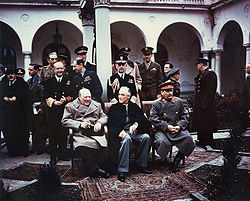Crimea
Crimea, (Ukrainian: Крим) sometimes also called The Crimea, is a peninsula in the Black Sea. The peninsula separates the Black Sea from the Sea of Azov. Crimea has a surface of 26,081 square kilometres (10,070 sq mi). About 2.4 million people live there.
The Ottoman Empire had the peninsula for a long time. In the 18th century the Russian Empire took control. The Crimean War was fought here.
Crimea was part of Russia until the Soviet Union gave it to Ukraine in 1954. Ukraine gave it a limited self-rule as an autonomous republic. The seat of the government is Simferopol, which is also the biggest city. Other major cities are Sevastopol and Kerch.
The Crimean crisis
In March, 2014, after a series of protests in Ukraine the previous month, Russian troops took control of Crimea. A referendum was held, in which over 90% of voters voted to join the Russian Federation. The Crimean parliament quickly proclaimed independence from Ukraine and on March 18, became the Republic of Crimea, a federal subject of Russia.
However, Ukraine and most other countries in the world continue to recognize that Crimea is part of Ukraine. On March 24, Russia was kicked out of the G8 (which became the G7), and on March 27, the United Nations General Assembly passed Resolution 68/262, which says that the referendum was invalid and Crimea belongs to Ukraine. In later months, many countries including the United States and the European Union started economic sanctions to prevent Russians and their goods from entering their countries.
Crimea Media
Ruins of the ancient Greek colony of Chersonesus
Genoese fortress in Sudak, 13th century, Republic of Genoa, originally a fortified Byzantine town, seventh century
The 11-month siege of Sevastopol during the Crimean War
The "Big Three" at the Yalta Conference in Crimea: Winston Churchill, Franklin D. Roosevelt, and Joseph Stalin
Unmarked Russian soldiers ("Little Green Men") outside the occupied parliament of Crimea








